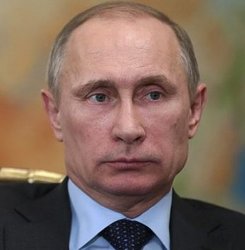Russia faces new economic sanctions from the European Union (EU) today. The EU has added twenty-four more Russian officials and separatist leaders to its blacklist; they are now subject to asset freezes and visa bans.
The ruble plunged to 37.72 against the dollar after news of the new sanctions became public.
The total number of people now subject to EU sanctions stands at 119.
The EU Council also announced the following restrictions:
- Strengthening of restrictions on Russia’s access to capital markets in the EU. Five major Russian state-owned banks no longer have access to loans from EU nationals or companies.
- It is now against the law to trade with these five banks in new bonds, equity or similar financial instruments whose maturity exceeds thirty days.
- Three major Russian energy and three defense companies are also now subject to these restrictions. The restrictions include Rosneft, Transneft and Gazprom.
- The EU added “Providing services related to the issuing of the above financial instrument, e.g. brokering, is also included in the prohibition.”
- A list of services required for deep water oil exploration and production, “arctic oil exploration or production and shale oil projects” in Russia have also been banned. This includes drilling, well testing, and logging services.
- The current ban on the exportation of dual use goods and technology for military use in Russia has been expanded to include nine mixed defense firms – these are no longer allowed to use goods that come from the EU.
Regarding the possibility of altering the new restrictions, President of the European Council, Herman Van Rompuy, said:
“We have always stressed the reversibility and scalability of our restrictive measures. Therefore, in the light of the review and if the situation on the ground so warrants, the Commission and European External Action Service are invited to put forward proposals to amend, suspend or repeal the set of sanctions in force, in all or in part. It is expected that the Council will consider these proposals urgently with a view to take action if appropriate.”
President Barack Obama said the United States will also impose tougher economic sanctions against Russia, specifically targeting the energy, finance and defense sectors. He is expected to announce details today.

Among the new people added to the list of EU sanctions are:
- Yury Vorobyov, Deputy Chairman of the Federation Council.
- Vladimir Zhirinovsky, leader Liberal Democratic Party.
- Vladimir Vasilyev, leader of the faction ‘United Russia’ in the State Duma.
- Deputy Viktor Vodolatsky.
- Leonid Kalashnikov, First Deputy Chairman of the Duma Committee on International Affairs.
- Vladimir Nikitin , Oleg Lebedev , Svetlana Zhurova , Alexander Babakov , Nikolai Levichev, of the State Duma.
- Igor Lebedev, Deputy Chairman of the State Duma.
- Alexei Naumets, Commander of 76th Division.
- The restrictions also include several members of the new leadership in Donbass (the Crimean government).
Russia threatens retaliation
Russia last week threatened an “asymmetrical” response if the EU imposed new sanctions. Prime Minister Dmitry Medvedev said his government is considering closing airspace to Western airlines.
Mr. Medvedev blames the EU, US and other allies for harming the Russian economy. In an interview with Vedomosti, a Russian newspaper, he said Russia has been far too patient with the US, EU and their allies. He believes his country should have responded more strongly.
“If there are sanctions related to the energy sector, or further restrictions on Russia’s financial sector, we will have to respond asymmetrically. This is not the way to go. We just hope our partners realize this at some point.”
Alexander Lukashevich, the Russian spokesman at the Foreign Ministry, described the EU’s new sanctions as “an absolutely unfriendly step.”
President Vladimir Putin’s aide, Andrei Belousov, told Ria Novosti, a news agency, that Russia is considering restricting the imports of light industrial goods, clothing, textiles and vehicles from the EU.
Mr Belousov said:
“We have a number of non-agricultural products, where our primarily European partners are more dependent on Russia than Russia on them. This applies, for example, to delivery vehicles, especially used cars. This applies to some types of light industrial products, where we ourselves can produce. Not all, but some types of clothing.”
Russian EU food ban
At the beginning of August, Russia responded to the previous round of sanctions by curbing the imports of foods and agricultural products from the EU and allies for 12 months.
In what economists described as a ‘bizarre’ statement, President Putin said the move was aimed at protecting the Russian economy. Most say it will have the opposite effect.
Russia needs to import fruits, dairy products, meat, vegetables and animals from the EU in order to guarantee supply and keep inflation down. Banning those products will just create shortages and push up an already rising price index.
As soon as the import restrictions were announced, food prices in Moscow shot up.
EU divided over sanctions strategy
After nearly two weeks of negotiations, divisions within the European Union became evident.
Several EU member states, especially those with close commercial ties to Russia, expressed concern about the impact of a Russian tit-for-tat response. They also wondered what effect the new restrictions might have on the fragile ceasefire in Ukraine.
In an interview with Reuters in Tuesday, Austrian Vice Chancellor Reinhold Mitterlehener said “We can only master the real problem via negotiations and a political solution and not with sanctions.”
Hungary, Slovakia, Italy, Finland and Austria have asked for a delay in the implementation of sanctions. Finland’s Prime Minister Alex Stubb said “The only thing that is doubted, by many countries not just Finland, is whether the timing is right.”
The new sanctions risk pushing the Eurozone, which reported zero GDP growth, into another recession.
